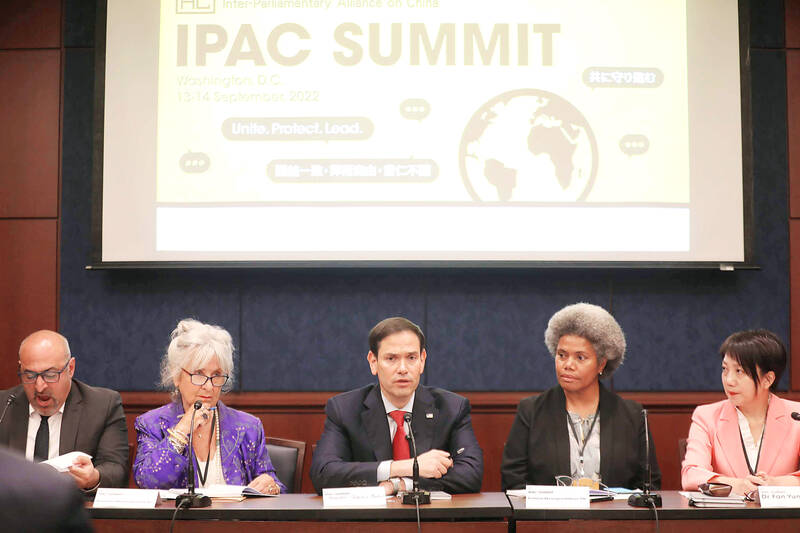The “status quo” across the Taiwan Strait must not be changed unilaterally, the Inter-Parliamentary Alliance on China (IPAC) said on Wednesday at the conclusion of its annual meeting in Washington, expressing support for Taiwan.
The communique declared that IPAC would continue to jointly defend peace and stability in the Taiwan Strait, as well as Taiwan’s economic and trade security, through the legislative bodies of its member countries.
More than 60 parliamentarians from different countries attended this year’s meeting and passed the communique without objection at its conclusion.

Photo: CNA
The meeting also included a session on strengthening democratic support for Taiwan, which was attended by Democratic Progressive Party Legislator Fan Yun (范雲), New Power Party Legislator Claire Wang (王婉諭) and independent Legislator Freddy Lim (林昶佐).
“If, in fact, the Chinese Communist Party is successful in subjecting the people of Taiwan to living under tyranny, it will be a moment that will steer the course of human events for generations,” US Senator Marco Rubio, an IPAC cochair, said during the meeting.
The communique also discussed human rights, defense of the rules-based global order, the political situation in Hong Kong, the strengthening of democracy worldwide and support for Ukraine.
The communique condemned China’s military exercises near Taiwan and its coercive military threats. It called on countries worldwide to oppose China’s tactics in the Strait, to promote state visits to Taiwan and upgrade the status of the country’s missions abroad.
It also called for Taiwan’s meaningful participation in the WHO, the International Civil Aviation Organization, Interpol, the UN Framework Convention on Climate Change, and other international covenants and organizations.
The communique also called on governments of all countries to convey to China that military aggression against Taiwan would come at a heavy price, and to consider substantive sanctions in response to military escalation by China.
Countries should make good use of intergovernmental mechanisms to curb economic coercion by China, and to ensure continued relations with Taiwan, it said.
The Ministry of Foreign Affairs yesterday in a statement said that Taiwan would continue to work with IPAC and other like-minded international partners to jointly maintain peace and stability in the Indo-Pacific region, and to defend the core values shared by global democracies.
IPAC is an international cross-party group of legislators working to develop policies that democratic countries can follow in their approach to China, according to the alliance’s Web site.
Its current members include cross-party legislators from the European Parliament, the US, the UK, France, Germany, the Czech Republic, Italy, Australia, Belgium, Canada, India, Italy, Japan, Lithuania and Ukraine, among others.

CHAOS: Iranians took to the streets playing celebratory music after reports of Khamenei’s death on Saturday, while mourners also gathered in Tehran yesterday Iranian Supreme Leader Ayatollah Ali Khamenei was killed in a major attack on Iran launched by Israel and the US, throwing the future of the Islamic republic into doubt and raising the risk of regional instability. Iranian state television and the state-run IRNA news agency announced the 86-year-old’s death early yesterday. US President Donald Trump said it gave Iranians their “greatest chance” to “take back” their country. The announcements came after a joint US and Israeli aerial bombardment that targeted Iranian military and governmental sites. Trump said the “heavy and pinpoint bombing” would continue through the week or as long

TRUST: The KMT said it respected the US’ timing and considerations, and hoped it would continue to honor its commitments to helping Taiwan bolster its defenses and deterrence US President Donald Trump is delaying a multibillion-dollar arms sale to Taiwan to ensure his visit to Beijing is successful, a New York Times report said. The weapons sales package has stalled in the US Department of State, the report said, citing US officials it did not identify. The White House has told agencies not to push forward ahead of Trump’s meeting with Chinese President Xi Jinping (習近平), it said. The two last month held a phone call to discuss trade and geopolitical flashpoints ahead of the summit. Xi raised the Taiwan issue and urged the US to handle arms sales to

State-run CPC Corp, Taiwan (CPC, 台灣中油) yesterday said that it had confirmed on Saturday night with its liquefied natural gas (LNG) and crude oil suppliers that shipments are proceeding as scheduled and that domestic supplies remain unaffected. The CPC yesterday announced the gasoline and diesel prices will rise by NT$0.2 and NT$0.4 per liter, respectively, starting Monday, citing Middle East tensions and blizzards in the eastern United States. CPC also iterated it has been reducing the proportion of crude oil imports from the Middle East and diversifying its supply sources in the past few years in response to geopolitical risks, expanding

Pro-democracy media tycoon Jimmy Lai’s (黎智英) fraud conviction and prison sentence were yesterday overturned by a Hong Kong court, in a surprise legal decision that comes soon after Lai was jailed for 20 years on a separate national security charge. Judges Jeremy Poon (潘兆初), Anthea Pang (彭寶琴) and Derek Pang (彭偉昌) said in the judgement that they allowed the appeal from Lai, and another defendant in the case, to proceed, as a lower court judge had “erred.” “The Court of Appeal gave them leave to appeal against their conviction, allowed their appeals, quashed the convictions and set aside the sentences,” the judges